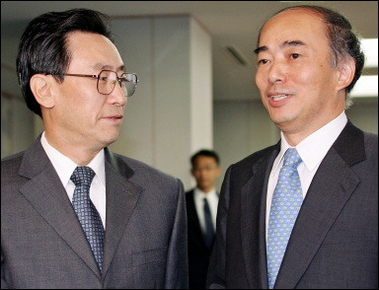|
Negotiators arrive in Beijing for North Korean nuclear talks
(AFP)
Updated: 2005-11-08 11:38
Negotiators for six-party talks aimed at dismantling North Korea's nuclear
program were arriving in Beijing but there was little hope of major progress
during the upcoming round.
The first session of the fifth round of talks will only last for three days,
while the following phase of the round will start by the end of the year,
China's vice foreign minister Wu Dawei told journalists.
The talks, involving China, the two Koreas, the United States, Russia and
Japan, begin Wednesday in central Beijing.
It will be "rather difficult" to make progress in the talks because big
differences remain between parties over the order of implementation of an
agreement reached at the last round in September, Wu said.

Chinese Vice Foreign Minister Wu Dawei (L)
chats with Kenichiro Sasae, Director General of Japan's Foreign Ministry,
before earlier talks between the two on North Korea's nuclear program.
[AFP] | The six sides issued a joint statement of
purpose after the last round of talks in September, agreeing to verifiably scrap
North Korea's nuclear programs in exchange for energy assistance and other
benefits.
Now discussions are expected to focus on the technically complex issue of
scrapping the nuclear programs in a manner consistent with the agreement, which
called for "commitment-for-commitment, action-for-action," diplomats said.
The United States wants North Korea to dismantle its nuclear program
immediately, while Pyongyang is holding out for benefits from Washington up
front before surrendering its bargaining chip.
South Korean chief negotiator Song Min-soon, and the North Korean delegation,
had already arrived in Beijing while delegates from the other nations were
expected to arrive later.
China has asked that the first phase of the next round end by Friday so that
diplomats at the talks can also attend the Asia Pacific Economic Cooperation
(APEC) leaders' summit in South Korea on November 18 and 19.
The long-running issue emerged in late 2002 when the United States accused
North Korea of engaging in a covert uranium enrichment program, a move that
violated a bilateral 1994 agreement to freeze its nuclear
programs.
|